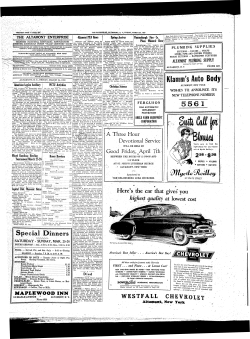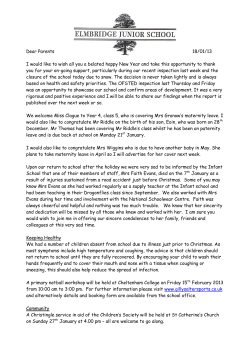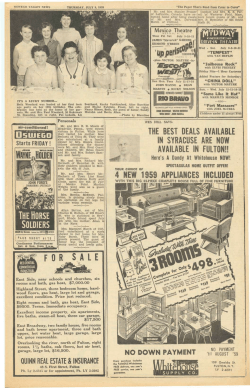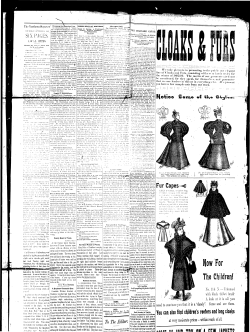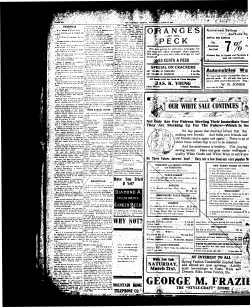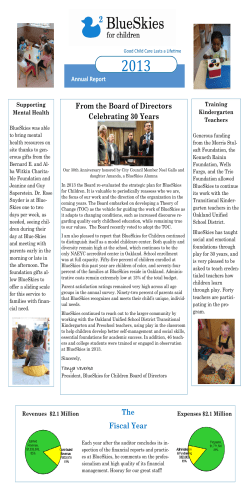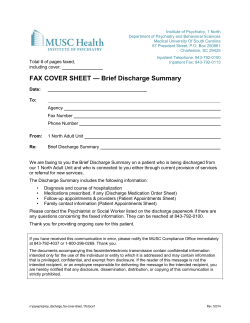
NHS Board Meeting Monday 25 March 2013
NHS Board Meeting 25 March 2013 Paper 14a NHS Board Meeting Monday 25 March 2013 Subject Minutes of the Healthcare Governance Committee Purpose To report to the Board Recommendation To receive the draft Healthcare Governance Committee Minutes of 6 February 2013 1. Background 1.1 Committees of the Board should submit approved and draft minutes to the Board. 2. Current situation 2.1 Attached are the draft minutes of 6 February 2013 3. Conclusion 3.1 The Board is asked to receive the minutes. Mrs Gillian Watson Chair – Healthcare Governance Committee 6 March 2013 1 of 8 HEALTHCARE GOVERNANCE COMMITTEE Wednesday, 6th February 2013 at 10am – 12.30pm Room 2, Training Centre, Ayrshire Central Hospital, Irvine Present: Mrs Gillian Watson, Non-Executive Board Member (Chairperson) (GW) Mrs Janet McKay, Non-Executive Board Member (JM) Mr Alistair McKie, Non-Executive Board Member (AM) Councillor Willie Gibson, Non-Executive Board Member (WG) Mr Ian Welsh, Non-Executive Board Member (IW) In attendance: Mrs Fiona McQueen, Executive Nurse Director (FMCQ) Mrs Mandy Yule, Integrated Care and Partner Services (MY) Ms Heather Reid, Clinical Improvement Unit Co-ordinator (Minutes) Mrs Kate Macdonald, Personal Assistant to Professor Craig White, Assistant Director (Minutes) Dr Grant McHattie (for item 6.8 only) (GM) 1. APOLOGIES FOR ABSENCE 1.1 Apologies received from Mr John Burns, Mr Martin Cheyne, Mr Jim Crichton, Mrs Liz Moore (LM) and Professor Robert Masterton. GW expressed thanks to Professor Robert Masterton for his contribution to the Committee and noted that although he was absent from the meeting, this would have been his last, prior to his retirement in February 2013. 2. DECLARATION OF ANY CONFLICT OF INTERESTS 2.1 There were no conflicts of interest declared. 3. DRAFT MINUTES OF THE MEETING HELD ON 7TH JANUARY 2013 3.1 The Minutes of the meeting held on 7th January 2013 were approved as an accurate record of discussions. 4. MATTERS ARISING 4.1 SHORT TERM ACTIONS FMcQ advised that the new SAER process is causing some difficulties with regards to timescales being met, and also workload for the Lead Reviewer. 2 of 8 As a consequence of difficulties with communication regarding approval of the reports and agreeing when to feed back to staff and families SAER 00001 and 00002 were not ready to be presented to the Committee as had previously been indicated. Both will be presented at the March meeting with Action Plans, by MY. FMCQ will discuss with Professor Craig White developing the on-going process. MY FMCQ Complaints FMCQ indicated that the paper on the Review of Complaints would not be available at the agreed time of March, due to the fact that the date of the internal Directorate meeting had been changed, as the original date did not suit one of the Directorates. The paper will now be presented at the April meeting; however a paper outlining the review process and progress to date would be presented to the next meeting. FMCQ GW requested that, when dates are changed in the Action Log, the original date remains in the entry as ‘formerly March’, for example, alongside the new date. Update Report for Blood Transfusion FMCQ confirmed that the Update will be brought to the March meeting. 4.2 Long Term Significant Adverse Event Review 16515 and 23813 GW asked who would be bringing the paper on the proposed interim solution for diagnostics results reporting to the Committee. It was agreed that Dr Alison Graham, the newly appointed, Executive Medical Director would assume this responsibility and would report to the Committee on this item at the April meeting. Alison Graham (AG) Litigation Report It was agreed that this report would be presented to the Committee at the May meeting by Dr Alison Graham, Executive Medical Director. 5. CONTINUOUS CLINICAL IMPROVEMENT 5.1 Maternity Pascal Metrics Update AG MY gave an update and overview of the ongoing work in Maternity, including the Pascal Metrics work. It was the first time the culture measure has been used in Ayrshire and Arran and the issues that had come to the fore were communication inconsistencies within the Community Team and a sense of remoteness between the staff and the managerial team. The culture was one of a sense of blame, which lead to staff being anxious and stressed. 3 of 8 As part of the solution, separate Clinical Directors of Obstetrics and of Gynaecology have been appointed. The Pascal Metrics work is another component of the solution, has been helpful in supporting improvements in culture, particularly in respect of the communication and relationships between clinicians and senior management. Through Plan, Do, Study, Act (PDSA) there are small steps of change being used across the team with all staff. GW indicated that at all times the Ayrshire Maternity Unit was clinically fit for purpose and that improvement work has been focus on cultural changes. GW thanked MY for the full update which was useful and positive. It was noted that the results of the Pascal Matrix work from Maternity had not yet been reported back to the Committee and it was requested that this be presented at the March meeting. 6. FOR ACTION 6.1 New and Updated Significant Adverse Event Reviews MY FMCQ reported that the new SAER process was placing a significant time pressure on the Lead Reviewer and is in the region of 70-100 hours’ work in addition to their own area of work. In addition, there was some pushback from some areas who thought they should have been consulted on the final reports. The new process, which was put together in response to the HIS report, was always going to require a bedding in time and a review once it had be tried out with real cases. AM expressed concern over the timescales, highlighting that the patient involved is also affected by long incident review times. It was clear from the SAERs tabled that previous timeframes of two years or more were unacceptable. FMCQ FMCQ said that a planned review would take place after the first 5 reviews and the issues of resourcing and timescales would be identified. 6.2 Significant Adverse Event Review Datix reference 12838 (DB84) MY presented the Action Plan, highlighting issues around note taking, the recording of results, breakdown in communication, where the sensitivity of patients’ needs were not considered appropriately and the follow-up of information to the patient not being correct. MY said that the Action Plan was finally agreed in December 2012 and is currently being implemented. The Committee noted that the review concluded that the death of the baby was not avoidable and that clinical care had been satisfactory. 4 of 8 There was however, learning to be made around record keeping and person centred care and culture. GW requested that, in accordance with agreed best practice and previous learnings, all Action Plans should include the name and role title of the individual responsible for each action, to allow for clarity and accountability and should also only name one responsible individual. All to note this for the future. 6.3 Significant Adverse Event Review Datix reference 16060 (DB78) The issue of discharge letters was discussed generally. MY mentioned that she was currently working with the Medical Secretaries to try to ensure more conformity between process and content. It appears that there is great variation in the length of content and the time taken between dictation and final typing of the letter. There is also a great deal of difference in format and initial work was focusing on using the SBAR format. MY also indicated that particular exemplars of discharge letters had been identified e.g. putting all drug changes at the top of a letter and that these could be used to help identify an optimal format for the letters. GPs had made the comment that they didn’t have time to read all the discharge letters that came in and shorter, concise letters were better. MY also mentioned the need to conform with SIGN guidelines for discharge which was a matter she was taking into account in this work. This led onto a query around whether the objective was to achieve standardisation across all discharge letters and how the work that MY was undertaking would be rolled out to or applied across the organistions. It was agreed that Dr Alison Graham (AG) would be asked to review the content, style and structure of Discharge Letters and report back to the Committee on this in June. The Committee stated that it wished assurances that there would be a faster turnaround to issue discharge Letters and that as far as possible, a standard format was adopted. FMCQ suggested that the audit of the absence of casenotes at outpatient clinics (Learning Point 3 in Action Plan) be brought to the March meeting. Mrs Liz Moore to provide this audit for the March meeting. 6.4 AG LM Significant Adverse Event Review Datix reference 8645 GW confirmed that all Actions were marked as ‘Completed’ in the Review and there were no questions or comments from the Committee. 6.5 Significant Adverse Event Review Datix reference 6857 (DB61) In Recommendation1, under ‘Evidence of Effective Implementation’ it stated that the findings would be cascaded through the Minutes of the 5 of 8 Governance Steering Group meetings for MH, ICES and ICPS. GW LM questioned how this would be done and has asked for Mrs Liz Moore to look at this and feedback a response to the Committee. GW questioned why the Action Status in Recommendation 2 said ‘Ongoing’ and why it would take a year to a develop global consent form for access to both Primary and Secondary care or any other medical records. It was reported that it has been difficult to get buy-in from the GP Practices. GW asked for Dr Ken Ferguson’s name to be added under ‘Responsible Officer’ in Recommendation 2. 6.6 Significant Adverse Event Review Datix reference 1105C93 GW asked why there are two Action Plans, dated November and December embedded within the evidence for this review. Mrs Liz Moore to provide clarification. 6.7 LM Continuous Clinical Improvement (CCI) and Monitoring within the Biggart Hospital, Prestwick FMCQ reported there have been a significant number of complaints and incidents at the Biggart Hospital, which is why the CCI and Monitoring Audit is being done. The improvement work has been ongoing during December 2012 and January 2013. GW questioned the use of the word ‘compliant’ in relation to the SSKIN Bundle audit in Lindsay Ward, when it is reported that it was only 72.5%. FMCQ suggested that compliant meant that the ward was using the audit, not necessarily that it was yet using it well. It was suggested that the monitoring of the Biggart now move to routine reporting. However it was felt that there was still some progress to be made and that monitoring continues at least until new management is more embedded. However it was agreed that this would move from LM being reported at every meeting to a 2-monthly basis from now on, rather than monthly. 6.8 Revised Arrangements: Proposed new model for the Investigation and Resolution of Performance Issues in Primary Care Following a lengthy discussion on this subject, Dr Grant McHattie subsequently appeared for this item to answer any questions. GW felt the model was a good start, but that it was reactive, rather than pro-active. GM was asked if there were plans in place to take this forward and develop processes which encouraged consistency of standards and patient experience across the primary care sector. GM shared that it was difficult to engage with contractors and that, given its limited resources, the Primary Care team was limited in its 6 of 8 ability to cover everything given that there are over 1.4 million GP consultations in a year. That being said, there is organisational memory which can feed into any review process, as well as feedback from the Scottish Public Service Ombudsman, patients or issues crossing desks. All Practices are required to conduct at least twelve Significant Event Reviews (SER) annually, with sharing being encouraged and with support provided by external organisations as well. There was discussion around the continual reference to the Primary Care sector being independent contractors whereas in reality there is a symbiotic relationship between the GP Practices and the Board. GW asked if the SERs could be shared with the Board. GM explained that the contractors cannot be dictated to, due to the nature of the working relationship. Furthermore, currently Reports could not be sought on any individual SERs, as the contractors are not licensed to share the information. However, GM agreed to approach the GP Sub Committee and ask if they would consider sharing their SERs and any learning with the Hospitals and other practices. It was also agreed that GM, in addition to asking for anonymised summaries of SERs, would ask for information on complaints from practices..This overview would come from the agreed approach to SER within GP practices. 6.9 Grant McHattie Healthcare Associated Infection (HAI) Position Report FMCQ presented the Paper and highlighted the work that the Infection Prevention and Control Team (IPCT) are doing as they work towards the HEAT HAI Targets. In particular, excellent progress had been made in the reduction of SABs FMcQ had confidence that this target was achievable. FMCQ explained that the Clostridium difficile infections rates of no more than 0.39 cases per 1000 occupied bed days have been for the over 65 age group to this point, however FMCQ felt it will be a lot more challenging to meet the targets for the under 65 age group, but they should still be able to be met. GW asked FMCQ who sets the target rates and FMCQ responded with them being recommended by herself to this Committee which would then recommend them to the Board. HAI is back on track with its recent trajectory but remains a challenge to achieve the annual targets. FMCQ will continue to report to the Committee on progress made. 7. FOR INFORMATION 7.1 Proposed new model for the Investigation and Resolution of Performance Issues in Primary Care Paper was noted 7 of 8 7.2 Child Protection Paper was noted 7.3 Services for Vulnerable Children Annual Report Paper was noted 8. ANY OTHER COMPETENT BUSINESS The Corporate Risk Register will be added to the March Agenda and GW and FMCQ will discuss if it will be tabled as a Paper or as Verbal. GW and FMCQ It was agreed that AM will continue to get the Committee Papers sent to him in the post and the other members will have them emailed. The Papers will be with the members five working days prior to the meeting with any Papers not received by this time being recorded as ‘Paper to Follow’. 9. DATE AND TIME OF NEXT MEETING Friday 08 March 10:00-12:30 Room 2, Training Centre, Ayrshire Central Hospital 8 of 8
© Copyright 2026
